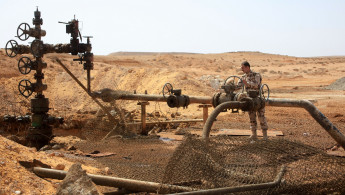Assad preparing to handover Syria's energy sector to Russia
The regime of Bashar al-Assad is reportedly seeking to rehabilitate and operate oil fields and power plants in areas controlled currently by the rebels and the Islamic State group respectively -- areas that the regime forces began recapturing in northern and Western Syria backed by Russian airstrikes.
Measures are already in place by the Syrian regime to hand over the Syrian energy sector to Russian companies, led by a law on partnership between the private sector and foreign companies issued in early 2016.
Last month as well, Russian press reports said Bashar al-Assad, during a recent visit to Moscow, signed an agreement consisting of ten clauses purportedly giving Russia the right to freely operate in Syria, which cannot be revoked except by written agreement.
In the same vein, a recent report published by Russia’s RIA agency said Syria’s ambassador to Moscow, Riad Haddad, had met with the chairman of Russian gas company Gazprom Alexei Miller, and discussed giving Russian energy firms oil and gas concessions in Syria and other forms of cooperation.
The meeting paved the way for a visit by a Syrian delegation chaired by Qais Khader, head of the Planning and International Cooperation Authority, to Moscow a few days ago.
The delegation met with Russian Energy Ministry officials and representatives of major Russian energy firms.
In remarks published by the BusinessToBusiness website which is considered close to the regime, the meeting discussed cooperation in energy, particularly oil and power generation.
The Syrian delegation also gave a detailed presentation on the state of the energy sector in Syria and the prospects for future investments after the war comes to an end and reconstruction begins.
In November, RT reported that Syrian authorities were hoping Russian companies would develop the country's offshore oil deposits, quoting remarks by Syrian Foreign Minister Walid Muallem after a meeting with Russian Deputy Prime Minister Dmitry Rogozin at the time.
 |
We have data that oil and gas deposits on a shelf off the coast of Syria have enormous potential. And we hope to see not only Russian warships in Syria, but also platforms for extracting oil --Syria's FM Walid al-Muallem |
 |
Muallem said that one Russian firm has already signed a contract and Damascus is waiting for other companies will follow suit.
Syria is ready to offer Russian companies “all possible incentives," he added.
According to Muallem, Baniyas city in the Tartous Governorate has one of the biggest oil reserves in the Mediterranean region.
In July, Syrian Prime Minister Wael Halqi said the country wants to join the Russia-led Eurasian Economic Union. This would allow Damascus easier economic and trade cooperation with "friendly nations", he said.
According to Halqi, Russia and Syria have signed a number of contracts for the construction of gas processing plants, irrigation facilities and power stations. In 2013, an agreement was signed for Russian companies to develop oil fields on the Syrian coast.
“Giving to the underserving”
The regime’s actions in this regard are illegal, however, said deputy chairman of the opposition Syrian National Colaition Hisham Mroueh. Mroueh accused the Syrian regime of buying Russian military support through investments and inducements.
“These agreements are signed by those who do not own [the wealth] with those who do not deserve it, and it will be possible to challenge them legally under international law,” Mroueh told The New Arab.
 |
In 2010, the US Geological Survey said Syrian territorial waters hold up to 3450 tcf of natural gas and 1.7 billion barrels in oil reserves. |  |
In turn, Salah Youssef, Syrian economist, told The New Arab: “Although oil prices are no longer attractive, and the conflict makes these concessions rather theoretical...what is happening is an indication of what the regime is preparing to do, in terms of transferring assets to Russia to...allow Russia to remain in Syria legally even after he is gone.”
After launching exploration projects in Syria, Russian energy firm Soyuzneftegaz suspended its plans in Syria until the conflict is resolved.
Soyuzneftegaz acquired the permit for joint exploration of Block 2 of Syria's territorial waters in December 2013. The company's chairman Yuri Shafranik said the project would be passed on to a Russian energy company, which he did not name.
Soyuzneftegaz acquired the permit for joint exploration of Block 2 of Syria's territorial waters in December 2013.
Shafranik also said that the company had to freeze its two onshore projects, block 12 and block 26, near Syria's borders with Turkey and Iraq.



